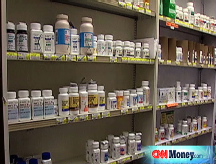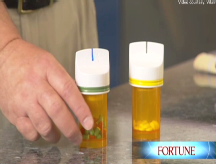Eli Lilly fined nearly $1.5B in drug marketing case
U.S. drug maker allowed 'off-label' marketing for anti-psychotic drug; to pay largest criminal fine for a corporation.
NEW YORK (CNN) -- Eli Lilly and Company, the giant American drug company, agreed to pay nearly $1.5 billion in fines for marketing one of its medicines for uses not approved by the Food and Drug Administration, the Justice Department announced Thursday.
The sum includes a criminal fine of $515 million, which the Justice Department called "largest criminal fine for an individual corporation ever imposed in a United States criminal prosecution."
The company will also pay up to $800 million in a civil settlement with the federal government and the states, and forfeit $100 million in assets, the Justice Department said in its statement, for total penalties of $1.415 billion.
The punishment stems from what the Justice Department calls "off-label promotion" of the drug Zyprexa - marketing the drug for uses not cleared by the FDA.
Eli Lilly (LLY, Fortune 500) had promoted the drug as a treatment for dementia, including Alzheimer's dementia in elderly people - for which it was never approved, the statement said.
The company pleaded guilty to one misdemeanor charge as part of the settlement, it said in a statement.
"Even though the company disagrees with and does not admit to the civil allegations, the company has agreed to settle the dispute," Eli Lilly's statement said.
John Lechleiter, chairman, president and chief executive officer of Lilly, said: "We deeply regret the past actions covered by the misdemeanor plea."
Zyprexa was approved to treat various conditions related to psychotic disorders, such schizophrenia and acute manic episodes. It was never approved for treatment of dementia.
The government alleged that "Eli Lilly's management created marketing materials promoting Zyprexa for off-label uses, trained its sales force to disregard the law and directed its sales personnel to promote Zyprexa for off-label uses," the Justice statement said.
Under the Food, Drug, and Cosmetic Act (FDCA), a company must specify the intended uses of a product in its new drug application to the FDA. Once approved, the drug may not be marketed or promoted for off-label uses. ![]()



